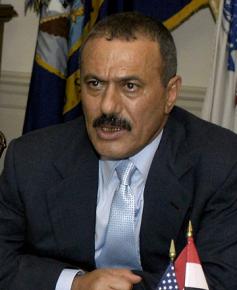A deal to protect a dictator
reports on a U.S.-supported attempt to ease Yemen's dictator from power--but to protect him from any responsibility for his many crimes.
THE OIL monarchies of the Persian Gulf have stepped in to broker a deal for Yemen's President Ali Abdullah Saleh. Saleh would leave finally leave office after 32 years--but he would avoid prosecution for corruption and violent repression of protest.
The terms of the deal seem calculated to drive a wedge between leaders of existing opposition parties--who immediately accepted the main points of the plan--and Yemen's burgeoning youth-led popular revolt. Aside from offering Saleh and his family immunity from prosecution, the agreement calls for an end to protests during a 60-day period leading to new elections.
Leaders of the grassroots movement in Yemen's major cities rejected the agreement and called for further struggle to win Saleh's immediate ouster without conditions. In the capital of Sanaa, where the movement started, demonstrators chanted, "No negotiation, no dialogue--Resign or flee," according to Reuters. Security forces and informal groups of pro-Saleh thugs have killed upwards of 130 protesters since February.

In recent weeks, the demonstrations have swelled into the millions in the cities and reached into the countryside, where 70 percent of Yemenis live. On April 23, the day that Saleh and the official oppositionists supposedly struck a deal to end the protests, the movement mounted a general strike across the country, including the four biggest cities. In Aden, the southern port city that until recently was a center of secessionist struggle, compliance with the strike by shops, markets and schools was 90 percent, according to Reuters.
The poor of town and country, who comprise 42 percent of Yemen's 23 million people, now widely support the movement that sprang up in early February at Sanaa University.
The mass participation of women also attests to the hopes of equality that the movement has raised for Yemenis. When Saleh declared on April 15 that "mixed-sex protests are illegal under Islam," millions of men and women around the country turned out together the next day to protest his remarks.
The response reached even into the supposedly backward "tribal" areas outside the cities. In al-Baida, 200 miles south of Sanaa, 20,000 marched to protest Saleh's condemnation of women's participation, according to the Yemen Times. Protesters raised placards with phrases such as, "Saleh do not speak about women, we will cut out your tongue."
THE SPONSOR of the latest plan for Saleh's departure is the Gulf Cooperation Council (GCC), the coalition of six U.S.-aligned dictatorships that conspired last month to crush the popular revolt in Bahrain.
The conditions of the deal are so sweet for Saleh that the mass movement was bound to reject them, so the GCC has handed Saleh a chance to back out of his offer to resign while blaming the intransigence of the movement.
The official opposition parties that endorsed the deal, grouped together in a coalition called the Joint Meeting Parties (JMP), are headed by millionaires--and at least one billionaire--many of them prominent tribal sheikhs who have profited from Saleh's corrupt way of doing business. Like the GCC's monarchs, who preside over vastly unequal societies themselves, the JMP leaders are looking for a smooth transition of power from one part of the elite to another.
Nevertheless, the GCC agreement got an immediate nod of approval from the Obama administration. The GCC's plan could "resolve the political crisis in a peaceful and orderly manner," the administration said in an e-mailed statement quoted by BusinessWeek. "We encourage all parties to move swiftly to implement the terms of the agreement."
Many U.S. politicians have sounded an alarm that al-Qaeda, which has 100 to 200 members in Yemen, according to estimates, could exploit a supposed situation of "chaos" while the succession in Sanaa is uncertain. BusinessWeek echoed this alarm by writing that "a weak central government in Yemen...risks mirroring the situation in Somalia across the Gulf of Aden, where there hasn't been a functioning administration since 1991."
The comparison to Somalia is ludicrous, where clan-based militias rose up against an oppressive state and then went to war against each other. In Somalia's state crisis, there was nothing resembling the popular bottom-up movement that has grown in Yemen this year and united the poor across tribal lines.
The movement has even begun to challenge the tribal hierarchy itself. Tribal sheikhs take oil-funded payoffs from the central state, while the state looks the other way as the sheikhs steal land from poorer tribesmen and monopolize the country's scarce groundwater.
The royal family of Saudi Arabia, Yemen's powerful neighbor to the north, is complicit in this regime of rural oppression, providing even bigger payoffs to Yemeni sheikhs than Saleh's government does--in return for a guarantee of "stability," according to a recent New Yorker article by Dexter Filkins.
It is this kind of stability that Saleh, the JMP, the GCC and the Obama administration are all determined to preserve. But the movement is determined to continue shaking Yemen. In Sanaa, Abdulmalik al-Yusufi, a leading activist said to Ahram Online, "The Gulf initiative addresses the problem as if it was a political crisis between two parties...We have taken to the streets in a revolution that is demanding a comprehensive change."


